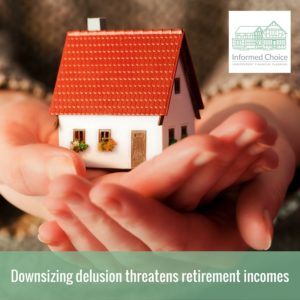 Does your retirement plan involve downsizing property to generate an income in later life?
Does your retirement plan involve downsizing property to generate an income in later life?
If downsizing is part of your long-term financial plans, you might get caught in the downsizing delusion which threatens retirement incomes.
New research has found that as many as three million people of working age who plan to downsize their homes to fund their retirement, instead of saving in a pension, could face a financial shock in later life.
The research from Royal London found that a small but growing proportion of people are choosing not to save for retirement using a pension.
Instead they plan to downsize their home – sell their property in retirement and buy a cheaper property – and use the proceeds to fund their lifestyles.
The latest Royal London research paper, “The Downsizing Delusion”, found that for the vast majority of people this strategy is likely to lead to a slump in their standard of living when they stop work.
The report found that the average person downsizing from an average detached house worth £310,000 to an average semi-detached house worth £197,000, and then using the proceeds to buy an annuity, would secure an annual income from this annuity plus their state pension of £13,700 a year.
In contrast, a typical full-time worker has an annual wage of £27,400. This means their income would be cut in half on retirement.
Other findings in the report highlighted various barriers to this plan to downsize property to fund retirement income.
In many cases, ‘the nest may not be empty’.
Because current generations of workers had children at later ages than previous generations, those children are staying at home for longer until they can buy a first home. Royal London pointed out that downsizing may be difficult if the ‘spare bedroom’ is not spare.
They also pointed out that you may still be paying your mortgage when the time comes to retire.
One in three mortgages now last until age 65 or older, and one in three of these is a first time buyer.
Growing numbers of people are still going to require an income in order to continue repaying their mortgages beyond traditional retirement ages.
There is also a risk that your planned retirement age might coincide with a period of falling house prices.
House prices tend go through cycles of boom and bust, so if your planned retirement age follows a fall in house prices, you might be forced to defer your retirement.
With other investments, it is often easier to smooth the ups and downs associated with the economic cycle, as different investment asset classes tend to behave differently.
Royal London also pointed out that there may be nothing to downsize to!
They explained that in rural areas particularly, finding a suitable property close to friends and family can be impossible.
Finally, you may not want to downsize when you reach your chosen retirement age.
If you have invested heavily in your family home over the years, you may not want to move away to a far smaller or cheaper property at just the point in life you will be able to spend more time in the property.
The Royal London survey found that out of larger family homes that are freed up by those over pension age, five out of six are released because of the death of the owner.
This means that only a tiny minority of larger family homes are freely downsized
Commenting on the research, Steve Webb, Director of Policy at Royal London said:
“Hoping to live off the value of your home could be a ‘downsizing delusion’ for millions of people.
“In most of Britain, the amount of money you could free up by trading down at retirement to a smaller property would generate a very modest income.
“Someone who chose to save for later life through their home rather than through a pension could easily see their income halve at retirement.
“If they opt out of workplace pension saving they are also missing out on tax relief on pension contributions and a valuable contribution from their employer.
“Even with today’s record house prices, very few people could fund a retirement by selling up and moving to a smaller property.
“In addition, house prices can be volatile, not least in the light of the recent Brexit vote, and depending on the value of a single asset – your home – to fund your whole retirement is an incredibly risky strategy.”
If you are concerned that the downsizing delusion threatens your retirement income, one way to get some assurance is to work with Informed Choice so we can construct a financial plan.
This will include a lifetime cash flow forecast, demonstrating your income and assets at different stages of life, and based on a number of different scenarios.
We can help provide some certainty around the downsizing option, comparing this to the most likely outcome from other ways of funding an income in retirement.
Rather than reaching retirement age with the hope of securing enough income to last for the rest of your life, we help our clients find real peace of mind by demonstrating what is possible and recommending the most suitable financial strategies for later life.

